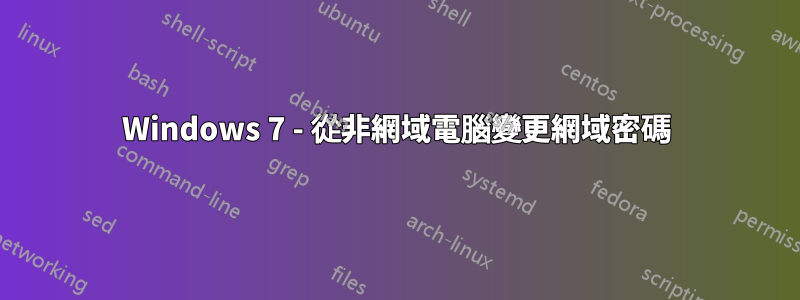
我想我在某處看到了一種技術,允許從命令列執行此操作(讓我們先忘記 Outlook Web,好嗎?),但我不能 100% 確定......它可行嗎?
答案1
您可以嘗試使用net user- 命令執行此操作。嘗試這個:
net user USERNAME PASSWORD /domain YOURDOMAINNAME
或者
net user USERNAME * /domain YOURDOMAINNAME
以獲得輸入新密碼的提示。
答案2
以下是執行此操作的實用程式的 C 原始程式碼:
#include <windows.h>
#include <lm.h>
#include <stdio.h>
#include <string.h>
#include <conio.h>
#define MAXNAMELEN 200
#define MAXPASSWDLEN 50
#define RETVAL_SUCCESS 0
#define RETVAL_INVALID_CMDLINE 1
#define RETVAL_BREAK 2
#define RETVAL_VERIFY_ERROR 3
#define RETVAL_CHANGE_ERROR 4
#define CH_BACKSPACE 8
#define CH_ENTER 13
#define CH_BLANK 32
#define CH_ASTERISK 42
#define AnsiToUnicode(FROM,TO) \
MultiByteToWideChar(CP_ACP, \
0, \
FROM, \
strlen(FROM)+1, \
TO, \
sizeof(TO))
#define OemToUnicode(FROM,TO) \
MultiByteToWideChar(CP_OEMCP, \
0, \
FROM, \
strlen(FROM)+1, \
TO, \
sizeof(TO))
UCHAR szAccountName[MAXNAMELEN];
UCHAR szDomainName[MAXNAMELEN];
UCHAR szSpecifiedAccountName[MAXNAMELEN];
UCHAR szSpecifiedDomainName[MAXNAMELEN];
UCHAR szOldPassword[MAXPASSWDLEN];
UCHAR szNewPassword[MAXPASSWDLEN];
UCHAR szVerification[MAXPASSWDLEN];
WCHAR wszAccountName[MAXNAMELEN];
WCHAR wszDomainName[MAXNAMELEN];
WCHAR wszOldPassword[MAXPASSWDLEN];
WCHAR wszNewPassword[MAXPASSWDLEN];
BOOL bQuiet=FALSE;
BOOL bInfo=FALSE;
BOOL bPasswordsSpecified=FALSE;
BOOL bUserSpecified=FALSE;
BOOL bDomainSpecified=FALSE;
void Usage(char *cmdname)
{
printf("Usage: %s [-q] [-i] [-p oldpass newpass] [-u user] [-d domain]\n",cmdname);
printf(" change password on the command line\n");
printf(" -q (quiet) suppress display of * while entering passwords\n");
printf(" -i (info) print account and domain information\n");
printf(" -p (passwords) specify old and new password on the command line\n");
printf(" -u (user) change password for any other user (default: you)\n");
printf(" -d (domain) select a different domain/machine (default: your domain)\n");
printf(" (C) 1997 by Alexander Frink ([email protected])\n");
printf(" All rights reserved.\n");
exit(RETVAL_INVALID_CMDLINE);
}
void ProcessCmdLine(int argc, char *argv[])
{
char c, *p, *arg0;
// algorithm for command line processing taken from SDK sample
// Win32/WinNT/Floppy/MFMT.C
arg0=argv[0];
if ( argc > 1 ) {
while (--argc > 0 ) {
p = *++argv;
if (*p == '/' || *p == '-') {
while (c = *++p) {
switch (tolower(c)) {
case '?':
Usage(arg0);
break;
case 'q':
bQuiet = TRUE;
break;
case 'i':
bInfo = TRUE;
break;
case 'p':
if (argc<3) Usage(arg0);
bPasswordsSpecified = TRUE;
argc--, argv++;
strcpy(szOldPassword,*argv);
argc--, argv++;
strcpy(szNewPassword,*argv);
break;
case 'u':
if (argc<2) Usage(arg0);
bUserSpecified = TRUE;
argc--, argv++;
strcpy(szSpecifiedAccountName,*argv);
break;
case 'd':
if (argc<2) Usage(arg0);
bDomainSpecified = TRUE;
argc--, argv++;
strcpy(szSpecifiedDomainName,*argv);
break;
default:
Usage(arg0);
break;
}
}
}
}
}
}
void GetUserAndDomain(UCHAR *szAccountName, UCHAR *szDomainName)
{
HANDLE hProcess, hAccessToken;
UCHAR InfoBuffer[1000];
PTOKEN_USER pTokenUser = (PTOKEN_USER)InfoBuffer;
DWORD dwInfoBufferSize, dwAccountSize = MAXNAMELEN, dwDomainSize = MAXNAMELEN;
SID_NAME_USE snu;
hProcess = GetCurrentProcess();
OpenProcessToken(hProcess,TOKEN_READ,&hAccessToken);
GetTokenInformation(hAccessToken,
TokenUser,
InfoBuffer,
1000,
&dwInfoBufferSize);
LookupAccountSid(NULL,
pTokenUser->User.Sid,
szAccountName,
&dwAccountSize,
szDomainName,
&dwDomainSize,
&snu);
}
BOOL GetPassword(UCHAR *szPrompt,UCHAR *szPasswd)
{
/*
this subroutine is partially (C) by
Steffen Krause: [email protected],
the author of SuSrv, a SU utility for Windows NT
Improvements: allow correction of typing errors (with 'Backspace')
exit on CTRL-C (returns FALSE, otherwise TRUE)
skip non-printable characters (function/cursor/escape)
optional: suppress *'s while entering password
*/
int i;
int ch;
i = 0;
printf("%s",szPrompt);
while(((ch = _getch()) != CH_ENTER) && (i < MAXPASSWDLEN))
{
if (ch==CH_BACKSPACE) {
if (i>0) {
szPasswd[i]=0;
i--;
if (!bQuiet) {
_putch(CH_BACKSPACE);
_putch(CH_BLANK);
_putch(CH_BACKSPACE);
}
}
} else if (ch==3) {
szPasswd[0]=0;
return FALSE;
} else if ((ch==0)||(ch==224)) {
// probably function or cursor key, skip this and next character
ch=_getch();
} else if (ch==27) {
// escape key, skip
} else {
szPasswd[i++] = ch;
if (!bQuiet) {
_putch(CH_ASTERISK);
}
}
}
szPasswd[i] = 0;
return TRUE;
}
void PrintErrorMessage(NET_API_STATUS status)
{
/*
In contrast to the documentation on NetUserChangePassword
(SDK 4.0 and VC++ 4.2), other error codes in addition to the listed
NET_API_STATUS are returned. Therefore I decided to list all possible
errors from winerror.h which have to do with passwords.
*/
switch (status) {
case NERR_Success:
// nothing to do
break;
case ERROR_ACCESS_DENIED:
printf("Error: The user does not have access to the requested information.\n");
break;
case NERR_InvalidComputer:
printf("Error: The computer name is invalid.\n");
break;
case NERR_NotPrimary:
printf("Error: The operation is allowed only on the primary domain controller of the domain.\n");
break;
case NERR_UserNotFound:
printf("Error: The user name could not be found.\n");
break;
case NERR_PasswordTooShort:
printf("Error: The password is shorter than required.\n");
break;
case ERROR_INVALID_PASSWORD:
printf("Error: The specified network password is not correct.\n");
break;
case ERROR_INVALID_PASSWORDNAME:
printf("Error: The format of the specified password is invalid.\n");
break;
case ERROR_NULL_LM_PASSWORD:
printf("Error: The NT password is too complex to be converted to a LAN Manager password.\n");
break;
case ERROR_WRONG_PASSWORD:
printf("Error: Unable to update the password. The value provided as the current password is incorrect.\n");
break;
case ERROR_ILL_FORMED_PASSWORD:
printf("Error: Unable to update the password. The value provided for the new password contains values that are not allowed in passwords.\n");
break;
case ERROR_PASSWORD_RESTRICTION:
printf("Error: Unable to update the password because a password update rule has been violated.\n");
break;
case ERROR_LOGON_FAILURE:
printf("Error: Logon failure: unknown user name or bad password.\n");
break;
case ERROR_PASSWORD_EXPIRED:
printf("Error: Logon failure: the specified account password has expired.\n");
break;
case ERROR_NT_CROSS_ENCRYPTION_REQUIRED:
printf("Error: A cross-encrypted password is necessary to change a user password.\n");
break;
case ERROR_LM_CROSS_ENCRYPTION_REQUIRED:
printf("Error: A cross-encrypted password is necessary to change this user password.\n");
break;
case ERROR_NO_SUCH_DOMAIN:
printf("Error: The specified domain did not exist.\n");
break;
default:
printf("Error: Undocumented error code %i.",status);
}
}
int main(int argc, char *argv[])
{
NET_API_STATUS status;
ProcessCmdLine(argc, argv);
GetUserAndDomain(szAccountName,szDomainName);
if (bUserSpecified) {
strcpy(szAccountName,szSpecifiedAccountName);
}
if (bDomainSpecified) {
strcpy(szDomainName,szSpecifiedDomainName);
}
if (bInfo) {
printf("Changing password for user '%s' on domain or machine '%s'...\n",szAccountName,szDomainName);
}
if (!bPasswordsSpecified) {
if (!GetPassword("Old password: ",szOldPassword)) {
return RETVAL_BREAK;
}
if (!GetPassword("\nNew password: ",szNewPassword)) {
return RETVAL_BREAK;
}
if (!GetPassword("\nVerification: ",szVerification)) {
return RETVAL_BREAK;
}
printf("\n");
if (strcmp(szNewPassword,szVerification)!=0) {
printf("Password verification failed!\n");
return RETVAL_VERIFY_ERROR;
}
}
AnsiToUnicode(szAccountName,wszAccountName);
AnsiToUnicode(szDomainName,wszDomainName);
OemToUnicode(szOldPassword,wszOldPassword);
OemToUnicode(szNewPassword,wszNewPassword);
status=NetUserChangePassword(wszDomainName,
wszAccountName,
wszOldPassword,
wszNewPassword);
if (status==NERR_Success) {
return RETVAL_SUCCESS;
} else {
PrintErrorMessage(status);
return RETVAL_CHANGE_ERROR;
}
}


